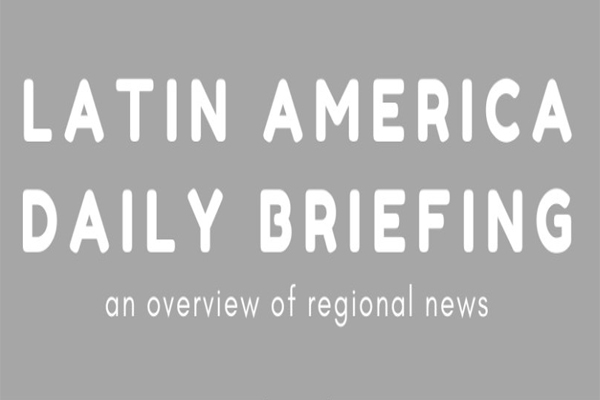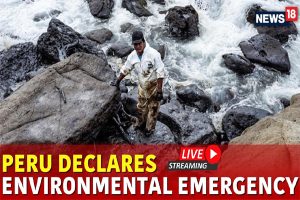
Climate change induced extreme weather is a reality in South America, where the last month has seen deadly landslides in Brazil, rampaging wildfire in Argentina and harvest-ruining flooding in the Amazon, reports the Associated Press. The events corroborate what a new Intergovernmental Panel on Climate Change report details: Global warming is altering the intensity and frequency of extreme weather events, such as El Nino and La Nina, the natural heating and cooling of parts of the Pacific that alters weather patterns around the globe. These events have also become more difficult to predict, causing additional damage, the report said.
The IPCC report, says changes in the timing and magnitude of precipitation along with extreme temperatures are impacting agricultural production across Central and South America. “Impacts on rural livelihoods and food security, particularly for small and medium-sized farmers and Indigenous Peoples in the mountains, are projected to worsen,” the report read.
News Briefs
Brazil
- Former president Luiz Inácio Lula da Silva has a real shot at becoming Brazil’s president again in October- and he may make green shifts a key part of his platform, reports Reuters. Creating green jobs in the Amazon region will be a top priority for Lula’s Workers’ Party. Plans include replanting forests, agroforestry, and cooperatives to sustainably harvest açaí. Under Lula, Brazil would also reopen its Amazon Fund, formerly used by other nations to pay Brazil to monitor and combat deforestation in order to combat climate change and protect biodiversity.
- And because so many of President Jair Bolsonaro’s harmful environmental policies were enacted by decree, they could be easily reversed in Lula’s first few months in office, experts told Reuters.
- Stark industrial decline in Brazil could be pivotal issue in this year’s presidential election. Bolsonaro has not made boosting industry a priority, while Lula has said that although commodities are important, Brazil needs “to be strong in industry, in science and technology”. The next few months are likely to involve a scramble to win the hearts and votes of places like São Bernardo, reports the Economist.
- Brazilian Senate president Rodrigo Pacheco said that bills to curb rising fuel prices would be on the table next week amid renewed pressure on prices after Russia’s invasion of Ukraine, reports Reuters. (See yesterday’s briefs.)
- Brazil’s resistance musicians ensured that Carnival took place on Rio de Janeiro streets, despite an official ban that angered many people by forbidding public bloco parties while permitting paid events, reports the New York Times.
Argentina
- Argentina’s government expects to send an agreement with the IMF to the country’s Congress today, which will have to ratify the deal to refinance a $44 billion debt. The deal faces significant obstacles from within the ruling Frente de Todos coalition, as well as questions from the opposition Juntos por el Cambio coalition. (Infobae)
- The IMF said the two sides had reached a staff-level agreement on a 30-month extended fund facility, including a program to tame high inflation, reduce money printing to finance the fiscal deficit, and deliver positive real interest rates. (Reuters)
- Argentina has now had 22 bailouts by the IMF, but Ilan Goldfajn, the Fund’s Western Hemisphere Department director, said in a press conference that this time would be different “because it is based on realistic goals, it is based on the pragmatic approach and it its based on ownership of the program by the (Argentine) authorities.” (Reuters)
- Argentina’s efforts to cut energy subsidies — a key component of the agreement with the IMF — will be complicated by rising global energy costs in response to the Ukraine conflict, according to the Latin America Risk Report.
Regional Relations
- The war in Ukraine has become a litmus test for how governments in Latin America view the changing global order. How is Washington positioning itself as the region’s preferred partner for development and economic growth? The White House’s top aide on Latin America, Juan González, joins the AQ podcast.
- El Salvador’s abstention from a Wednesday U.N. vote condemning Russia’s invasion of Ukraine is a clue as to President Nayib Bukele’s stance on the conflict, but also says a lot about El Salvador’s tensions with the U.S. over financial sanctions and bitcoin. The U.S. Treasury and E.U. blacklisted the Russian Central Bank and the G7 said their sanctions could eventually include cryptocurrencies, reports El Faro English. (See yesterday’s post.)
- CARICOM has left the possible imposition of sanctions on Russia to individual member states following hours of intense deliberation on the second day of the 33rd Inter-Sessional Meeting of Heads of Government in Belize. (Jamaica Gleaner)
- “Russia’s engagement with Latin America after its unprovoked invasion of Ukraine, and the Latin American response to the invasion, illustrates the growing strategic challenge to the U.S. from the survival and proliferation of populist authoritarian regimes in the Western Hemisphere,” argue Evan Ellis and Ryan Berg in the Hill. (See yesterday’s post, and Wednesday’s.)
- Former Brazilian president Luiz Inácio Lula da Silva met with Mexican President Andrés Manuel López Obrador on Wednesday, the latest international visit in which Lula was embraced by current leaders. AMLO characterized the meeting as one “between friendly politicians and social leaders who fight for the people and to achieve positive changes in Latin America and the world.” (El País)
- The two leaders oversaw the signing of a pact between Lula’s Workers’ Party and AMLO’s Morena, and promised closer ties if Lula wins Brazil’s presidential election later this year. (Reuters)
Nicaragua
- Nicaraguan opposition figure Cristiana Chamorro, detained since June last year went on trial behind closed doors yesterday, the latest would be presidential candidate to face court proceedings in El Chipote prison, reports AFP.
Colombia
- Colombia’s human rights situation worsened in 2021 amid rising violence which mainly affected Afro-Colombians and indigenous communities, the U.N. Office of the High Commissioner for Human Rights said yesterday. Some 78 multiple homicides – locally referred to as massacres – verified by the OHCHR left 292 people dead in 2021, while 72,000 people were forced from their homes by illegal armed groups, according to the UN agency’s annual report. (Reuters)
- Colombia will hold legislative elections on March 13, and the leftist Pacto Histórico is leading with 38 percent voter intent in a new Ivamer poll. The same poll puts Gustavo Petro in a strong lead to win the presidential nomination for Pacto Histórico — the vote will also be on March 13 — and to later win the presidential election that will be held on May 29. (Caracol)
- Colombia’s National Liberation Army (ELN) declared a six-day ceasefire for the upcoming legislative elections. (Reuters)
Regional
- A new Atlantic Council report identifies how the withdrawal of correspondent banking relations, otherwise known as de-risking, affects Caribbean economies, people, and US-Caribbean relations. Access to the global financial system and development tools is critical for Caribbean economic recovery, growth, and resilience. Key to this access is correspondent banking, but over the past several years, most Caribbean governments and banks have seen a steady decline in correspondent banking relationships as institutions across the world deem the region as too small to be profitable due to high compliance costs and the perception that the region is a high-risk jurisdiction.
Chile
- Chile’s Constitutional Convention is eight months old today, and has until July 4 to finish drafting a new magna carta. The discussions will profoundly alter Chile’s governance structure. The current proposal would create a unicameral Congress, with a Territorial Council that some interpret as a second chamber. (LaBot Constituyente)
- Many of the Environmental Commission’s proposals were voted down by the Convention’s plenary, including a clause that would permit any person to represent “nature” in court, and another that would make crimes against nature imprescriptible. Several other clauses passed, including recognition of the environmental crisis as a consequence of human activity, the duty of the State to “guarantee and promote the rights of nature”, the protection of animals as sentient beings, education based on empathy with animals, the right to binding participation in environmental decisions and the right of access to environmental information. (LaBot Constituyente)
- The Justice Commission approved juridical pluralism (recognizing Indigenous justice systems) and irremovability of judges. The commission has also approved removing Supreme Court judges after a 12-year mandate and a chapter on feminist justice. (LaBot Constituyente)
Honduras
- An anti-corruption team from Honduras’ Attorney General’s Office visited presidential offices a week after President Juan Orlando Hernández stepped down and found paper shredders and none of the financial documents they were looking for, Javier Santos, head of the special unit against corruption networks told the Associated Press.
Migration
- Mexican smuggling gangs have sawed through new segments of border wall 3,272 times over the past three years, according to unpublished U.S. Customs and Border Protection maintenance records obtained by the Washington Post. The maintenance records show damage has been more widespread than previously known, pointing to the structure’s limitations as an impediment to illegal crossings.
Mexico
- Mexican President Andrés Manuel López Obrador’s “obsession with characterizing journalists as political enemies not only adds to the deadly climate of intimidation in Mexico, but also reveals the populist leader’s brazen efforts to obscure the fact that the country is becoming more and more dangerous, with various regions now resembling war zones,” writes León Krauze in the Washington Post.
- Mexican security forces said they found almost 3 million rounds of ammunition and at least 16 fully automatic, belt-fed machine guns in raids this week on several houses in the northern border state of Sonora. The Defense Department said the seizure was the biggest haul of illegal ammunition in recent memory in Mexico, more than enough to supply a battalion-size force. (Associated Press)
Ecuador
- Ecuador’s criminal organizations are increasingly emulating shock tactics employed by Mexico’s cartels, reports AFP. In January and February this year, 468 people were killed in Ecuador. More than 320 of this year’s victims have been inmates — many dismembered and burnt in grisly wars between rival prison gangs allied to international drug cartels.
Venezuela
- President Nicolas Maduro announced a 18-fold increase in Venezuela’s monthly minimum wage to roughly 126 bolivars ($28) by pegging it to the value of half a petro, the government’s cryptocurrency. (Bloomberg)
Peru
- At least 2,000 Peruvian artisanal fisherman have been out of work for more than a month after an oil tanker sent thousands of barrels of crude gushing into the sea. Beaches have been closed since the Jan. 15 Repsol oil spill, and fishing along the affected shore has been prohibited indefinitely. Seafood restaurants are empty. Local tourism is at a standstill, reports the Washington Post.
Uruguay
- Uruguay is often seen as slightly dull — but its part of what makes the country a regional success story, along with stable politics and business friendly policies, according to the Economist.
St. Barts
- A December judicial ruling against a luxury hotel in construction on St. Barts might signal a turning point in the hyper-development of this tropical Arcadia for the rich, according to the New York Times.
Histories
- Capitalism and Slavery, a book of unpalatable truths about Britain’s slave trade has become a UK bestseller, almost 80 years after author Eric Williams (later Trinidad and Tobago’s prime minister) was told it would never be published. His central argument was that the abolition of the slave trade was not born out of humanitarian wishes but of economic necessity, reports the Guardian.
- Mateo Sobode Chiqueno is an Indigenous Ayoreo oral historian whose 1,000 cassette tapes of interviews partially preserve the fast-disappearing culture of the Chaco forest hunter gatherers in Paraguay. (Guardian)
http://latinamericadailybriefing.blogspot.com/












